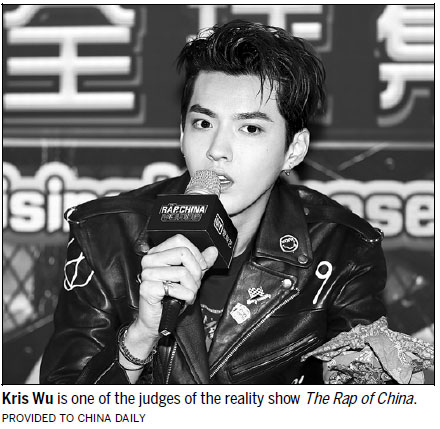
"Hip-hop is rising in China!"
This is the slogan of the country's first reality show focusing on the genre.
The first season of The Rap of China, which is produced by the country's major online-video platform iQiyi, will premiere on the website on Saturday and run weekly for 12 episodes a season.
The series is expected to bring the genre out from the "underground".
Production cost 200 million yuan ($29 million).
Over 700 people auditioned in the first round in early May, which is shown in the first episode, and 70 will appear later in the series.
The judges were 27-year-old superstar Kris Wu, and Taiwan musicians Wilber Pan, 43-year-old Chang Chen-yue and MC Hotdog (the stage name of Yao Chung-jen).
"The participants' zest and spirit remind me of my teen years," says Chang.
"It's great to open a door to Chinese hip-hop and dig out more talent."
Chang confesses he didn't even know what criteria should be used to judge candidates, since the genre isn't mainstream.
"I'm also learning in the show," he says. "After all, hip-hop is beyond voice or rhythm. I generally prefer someone with a strong hip-hop temperament and energy."
Wu points out many Chinese stereotype rappers as having strange clothing and makeup.
"It represents passion and a lifestyle," he explains.
"It's a small circle in China. Many rappers are good but switch to other genres to make money."
Wu expects the new show to turn this around.
The Rap of China features both amateurs and stars. Some candidates wore masks to hide their identities during auditions.
"I was shocked to discover a good friend of mine, who was a famous rapper in Taiwan, among the contestants," MC Hotdog says.
"He didn't do very well. Perhaps he hasn't practiced much in years."
The performer released a rap online the day after he was eliminated criticizing the show.
The show's demo often portrays tension when competitors are taken out of the running.
But there's much more to the spirit of the series, producer Chen Wei says.
"There are various kinds of hip-hop," Chen says.
"It doesn't necessarily contain bad language. The genre shouldn't be misunderstood."
About 600 beats were created for the show, he says.
Many previous Chinese hip-hop songs used original lyrics over beats from overseas, violating copyrights.
"Hip-hop entered China about 20 years ago," Chen explains.
"But many Chinese rappers back then only mimicked English pronunciation and deliberately expressed gangsters' anger, which was actually irrelevant to our lives."
Chen is happy to see the works brought by competitors are full of original thoughts.
"They're about their own emotions, struggles and hometowns. They reflect people's Chinese Dream. They correct many stereotypes about youth."
Most competitors auditioned in Mandarin, but some also rapped in dialects.
Controversy surrounded a Chinese-American's elimination because his lyrics were in English.
IQiyi's content development head Wang Xiaohui expects the show will promote the genre long term.
"Hip-hop encourages people to be self-confident and creative," he explains.
"Young people can express their attitudes, values and understanding of life."
Wang says the show not only aims to entertain but also to spur a new trend in Chinese culture through the internet, and derivative products will be developed from The Rap of China.
wangkaihao@chinadaily.com.cn
